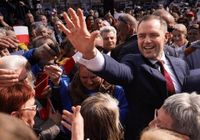In a political storm brewing over the actions of Karol Nawrocki, President of the Institute of National Remembrance (IPN) and a candidate for the upcoming presidential elections, questions regarding his integrity and moral standing have come to the forefront. The controversy centers around the acquisition of a studio apartment from an elderly individual, which has raised eyebrows and ignited a media frenzy.
On May 9, 2025, Nawrocki was scheduled to appear before the Sejm's Justice and Human Rights Committee to explain his financial status, a demand made by Szymon Hołownia, the Marshal of the Sejm. However, just days before this crucial hearing, it was revealed that Nawrocki would not attend. Emilia Wierzbicki, a spokesperson for Nawrocki's campaign, stated that the committee "has no legal basis" to scrutinize the asset declarations of the IPN president.
This situation has left many questioning the accountability of Nawrocki, especially since the law mandates that the president of the IPN must exhibit a high degree of morality. Paweł Śliz, the chairman of the committee, clarified that while they cannot impose penalties for Nawrocki's absence, they could pass a resolution declaring that he violated the law governing the IPN.
Professor Andrzej Friszke, a former member of the IPN College, highlighted the gravity of the situation, stating, "A president of the IPN refusing to cooperate with parliament creates a deeply critical situation. However, the Sejm lacks the authority to remove him from this position, as only the IPN College can initiate such a motion." This raises concerns about the influence of the ruling party, PiS, which has populated the IPN College with its loyalists since 2016.
Adding to the controversy, Nawrocki's acquisition of the apartment from Jerzy Ż., an 80-year-old man in poor health, has been described as dubious. Critics, including Friszke, have expressed that these actions could constitute a violation of the dignity expected of the IPN president. Friszke remarked, "If there are any suspicious maneuvers by the current IPN president around his personal assets at the expense of an older person, this indicates a violation of the dignity of the president of the IPN."
In light of the mounting pressure, Nawrocki has announced his decision to donate the apartment to charity, stating it would serve the elderly and those in need. He emphasized, "Evil must be overcome with good," and assured that the deed would allow Jerzy Ż. to continue using the apartment for the rest of his life. However, some see this as an attempt to quell the growing public outrage rather than a genuine act of altruism.
The upcoming presidential elections, set for May 18 and June 1, 2025, add another layer of complexity to Nawrocki's situation. Polls indicate that he is likely to advance to the second round alongside Rafał Trzaskowski, the candidate of the ruling majority. Nawrocki's recent engagement with Catholic organizations at the Sanctuary of St. Andrew Bobola, where he signed a framework agreement with over twenty groups, underscores his strategy to solidify support among conservative voters.
During this meeting, Nawrocki emphasized the importance of Christian values in Poland, asserting that they form the foundation of the nation and the European Union. He stated, "Christian values have become the foundation of our homeland. They are also the foundation of the common European Union, which today forgets about this. Therefore, we need to remind everyone of this." His rhetoric aimed to resonate with a demographic that values traditional Christian principles.
Furthermore, Nawrocki's commitment to defending life, marriage, and family, as well as his stance against national vices, were highlighted in the agreement he signed with the Catholic organizations. He expressed gratitude to the Catholic Church, recognizing its role during times of occupation as a bastion of freedom and independence for Poland.
As the media continues to scrutinize Nawrocki's actions and motives, the political implications of this controversy are significant. The backlash against his handling of the apartment situation may impact his presidential campaign and the perception of his character among voters. With the elections approaching, how Nawrocki navigates these challenges could determine his political future.
In a broader context, the situation reflects the ongoing tensions in Polish politics, where the intersection of personal conduct, public service, and political ambition often leads to intense scrutiny. As the Sejm prepares to address the issues surrounding Nawrocki, the implications for the IPN and its leadership remain uncertain.
Ultimately, the unfolding drama surrounding Karol Nawrocki serves as a reminder of the complexities of political accountability and the expectations placed on public figures. With the elections on the horizon, both Nawrocki and the ruling party face a critical moment that could shape the future of Polish leadership.

